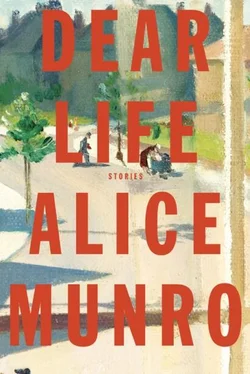Sometimes my mother and I talked, mostly about her younger days. I seldom objected now to her way of looking at things.
Several times, she told me a story that had to do with the house that now belonged to the war veteran named Waitey Streets—the man who marvelled at the length of time it was taking me to get through school. The story was not about him but about someone who had lived in that house long before he did, a crazy old woman named Mrs. Netterfield. Mrs. Netterfield had had her groceries delivered, as we all did, after ordering them over the phone. One day, my mother said, the grocer forgot to put in her butter, or she forgot to order it, and when the delivery boy was opening the back of the truck she noticed the mistake and became upset. And she was prepared, in a way. She had her hatchet with her and she raised it as if to punish the grocery boy—though, of course, it wasn’t his fault—and he ran up to the driver’s seat and pulled off without even closing the back doors.
Some things about this story were puzzling, though I didn’t think about them at the time and neither did my mother. How could the old woman have been sure already that the butter was missing in the load of groceries? And why would she have come equipped with a hatchet before she knew there was any fault to find? Did she carry it with her at all times, in case of provocations in general?
Mrs. Netterfield was said to have been quite a lady when she was younger.
There was another story about Mrs. Netterfield that had more interest because it featured me and took place around our house.
It was a beautiful day in the fall. I had been set out to sleep in my baby carriage on the little patch of new lawn. My father was away for the afternoon—perhaps helping out his father on the old farm, as he sometimes did—and my mother was doing some clothes-washing at the sink. For a first baby there was a celebratory load of knitwear, ribbons, things to be washed carefully by hand, in soft water. There was no window in front of my mother as she washed and wrung things out at the sink. To get a look outside, you had to cross the room to the north window. That gave you a view of the driveway, which led from the mailbox to the house.
Why did my mother decide to leave her washing and wringing out in order to look at the driveway? She was not expecting any company. My father wasn’t late. Possibly she had asked him to get something at the grocery store, something she needed for whatever she was making for supper, and she was wondering if he would be home in time for her to make it. She was a fairly fancy cook in those days—more so, in fact, than her mother-in-law and the other women in my father’s family thought necessary. When you looked at the cost, as they would say.
Or it may have had nothing to do with supper but have involved a clothes pattern he was picking up, or a piece of material for a new dress she wanted to make for herself.
She never said afterwards why she had done it.
Misgivings about my mother’s cooking were not the only problem with my father’s family. There must have been some discussion about her clothes, too. I think of how she used to wear an afternoon dress, even if she was only washing things at the sink. She took a half-hour nap after the noon meal and always put on a different dress when she got up. When I looked at photographs later on, I thought that the fashions of the time had not been becoming to her, or to anybody. The dresses were shapeless, and bobbed hair did not suit my mother’s full, soft face. But this would not have been the objection of my father’s female relatives who lived close enough to keep tabs on her. Her fault was that she did not look like what she was. She did not look as if she had been brought up on a farm, or as if she intended to remain on one.
She did not see my father’s car coming down the lane. Instead, she saw the old woman, Mrs. Netterfield. Mrs. Netterfield must have walked over from her own house. The same house where, much later on, I would see the one-armed man who teased me, and just the one time his bob-haired wife, at the pump. The house from which, long before I knew anything about her, the crazy woman had pursued the delivery boy with a hatchet, on account of butter.
My mother must have seen Mrs. Netterfield at various times before she saw her walking down our lane. Maybe they had never spoken. It’s possible, though, that they had. My mother might have made a point of it, even if my father had told her that it was not necessary. It might even lead to trouble was what he probably would have said. My mother had sympathy for people who were like Mrs. Netterfield, as long as they were decent.
But now she was not thinking of friendliness or decency. Now she was running out the kitchen door to grab me out of my baby carriage. She left the carriage and the covers where they were and ran back into the house, attempting to lock the kitchen door behind her. The front door she did not need to worry about—it was always locked.
But there was a problem with the kitchen door. As far as I know, it never had a proper lock. There was just a custom, at night, of pushing one of the kitchen chairs against that door, and tilting it with the chair back under the doorknob in such a way that anybody pushing it to get in would have made a dreadful clatter. A fairly haphazard way of maintaining safety, it seems to me, and not in keeping, either, with the fact that my father had a revolver in the house, in a desk drawer. Also, as was natural in the house of a man who regularly had to shoot horses, there was a rifle and a couple of shotguns. Unloaded, of course.
Did my mother think of any weapon, once she had got the doorknob wedged in place? Had she ever picked up a gun, or loaded one, in her life?
Did it cross her mind that the old woman might just be paying a neighborly visit? I don’t think so. There must have been a difference in the walk, a determination in the approach of a woman who was not a visitor coming down the lane, not making a friendly approach down our road.
It is possible that my mother prayed, but never mentioned it.
She knew that there was an investigation of the blankets in the carriage, because, just before she pulled down the kitchen-door blind, she saw one of those blankets being flung out to land on the ground. After that, she did not try to get the blind down on any other window, but stayed with me in her arms in a corner where she could not be seen.
No decent knock on the door. But no pushing at the chair, either. No banging or rattling. My mother in the hiding place by the dumbwaiter, hoping against hope that the quiet meant the woman had changed her mind and gone home.
Not so. She was walking around the house, taking her time, and stopping at every downstairs window. The storm windows, of course, were not on now, in summer. She could press her face against every pane of glass. The blinds were all up as high as they could go, because of the fine day. The woman was not very tall, but she did not have to stretch to see inside.
How did my mother know this? It was not as if she were running around with me in her arms, hiding behind one piece of furniture after another, peering out, distraught with terror, to meet with the staring eyes and maybe a wild grin.
She stayed by the dumbwaiter. What else could she do?
There was the cellar, of course. The windows were too small for anybody to get through them. But there was no inside hook on the cellar door. And it would have been more horrible, somehow, to be trapped down there in the dark, if the woman did finally push her way into the house and came down the cellar steps.
There were also the rooms upstairs, but to get there my mother would have had to cross the big main room—that room where the beatings would take place in the future, but which lost its malevolence after the stairs were closed in.
Читать дальше












